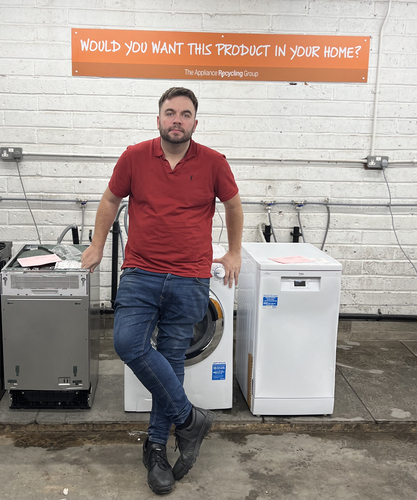Businessman’s warning as scammers target vulnerable online shoppers looking for appliance bargains
A businessman who runs one of the UK’s leading appliance reuse networks has called for more to be done to protect people buying electrical goods online this Christmas.
James Farmer, director of The Appliance Recycling Group, based in Tipton, in the West Midlands, said vulnerable people looking for low-price second-hand goods and appliances amid the cost-of-living crisis were being ripped off and left out of pocket by unscrupulous traders.
“Appliance poverty is a real issue, and the cost-of-living crisis means people are being forced to find new ways to save money,” he said. “When their washing machine or fridge breaks, they have no choice but to look for a quick and cheap replacement online.
“But they are in a vulnerable position. Scammers posing as individuals may take cash and leave them with a faulty appliance or one that doesn’t work at all, which makes a bad thing worse.
“Scammers are everywhere, especially at this time of year, and people should take extra care when they are looking to buy second-hand goods online. The companies that run these online buying and selling sites should also take more care to protect those involved.”
James said sites like eBay had systems in place to protect buyers, but others were not so robust.
Facebook Marketplace in particular is a huge draw for people looking for bargains. It does have measures in place for users to report scammers and fraudulent posts, but people are still falling victims to unscrupulous sellers.
James said: “Some people pose as homeowners saying they need to sell an item due to a house move or redecoration. Some of them actually have dozens of fake profiles that they set up to sell hundreds of items online.
“They sometimes offer to deliver the item and ask for cash so you can be left with an item that doesn’t work, having handed over cash and you don't even have an address to trace it back to.
“You could even then be left with a £25 fee to have the item taken away.”
James added: “Reuse is more important than ever now, and more and more people are looking to buy second-hand appliances. We are seeing an increase in the number of people buying reuse appliances, but if they’re buying from an individual online seller, they have to take extra care as there is no right of warranty.”
James added where possible people should buy from authorised reuse facilities, as The Appliance Recycling Group, based in George Henry Road.
“We supply items with a 90-day warranty, and we test 55,000 products a year across our network. We comply with the strictest of environmental standards, which govern the reuse of electrical goods, so buyers have complete peace of mind,” he added.
“It might be a few pounds more than that online bargain, but it's almost like an insurance policy. It’s worth paying that little extra to know you are getting an item that works and is safe to use.”
James said people should follow the following tips to stay safe when buying online:
Always look for a picture of the item in situ – if it’s a fridge or washing machine it should be pictured in a kitchen or utility room. Pictures of the item outside or in a garage should ring alarm bells as it can be a sign that the item has not been in use in a home.
Don't buy an appliance based on a photo; ask to see the appliance on a video call. A photo cannot indicate whether that appliance is capable of working.
Don't fall for an offer of free delivery. A buyer could drop it off, take your cash and leave you with a faulty or broken item. Ask to collect the item, even if you are unable to. By engaging the seller, you have an address (you can let them know that a delivery would help after, if you are satisfied). When engaged, scammers will often tell you that the item is sold once you press for more details.
Don’t pay cash – a credit or debit card, bank transfer or PayPal is best. Any legitimate individual or business or seller won’t mind how you pay.
Facebook Marketplace offers shopping safety tips and guidelines to avoid fraudsters on the site and makes it easy to report a suspected scam. In some cases, it can offer a refund for those who have been targeted.
Meta, which owns Facebook, works closely with law enforcement to support investigations, and keep scammers off its platforms. It is also a part of Stop Scams UK, an industry-led group of businesses working together to stop the spread of scams.
To find out more about the Appliance Recycling Group, visit theappliancerecyclinggroup.com
ENDS
Issued by Sally-Anne Youll at Nurture Media. For more information call 07771 517089 or email sally-anne@nurturemedia.co.uk
This press release was distributed by ResponseSource Press Release Wire on behalf of Nurture Media in the following categories: Personal Finance, Business & Finance, Manufacturing, Engineering & Energy, for more information visit https://pressreleasewire.responsesource.com/about.
